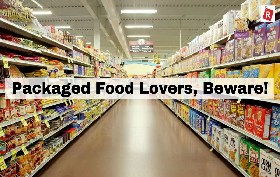Packed food is one of the most convenient go to food for many Indian. The packed food includes everything from your favorite chips and noodles to your go to soft drink. But, do you ever read the ingredients or the percentage of chemicals these packed food items contain? Here is a report by Access to Nutrition Initiative (ATNi), Check what it says about the packed food Indian consume.
According to a report, fifth edition of the Global Access to Nutrition Index 2024, Global giants like Unilever, Coca-Cola, Mondelez, PepsiCo, Kellanova, Nestle, Lotte and Mars are selling unhealthy products in India, and other low income countries.
Global Rating Report:
A global report by the Access to Nutrition Initiative (ATNi), a nonprofit organization, exposes a serious concern over the significant differences in health ratings. It provides shocking evaluations of food ratings in different countries. In low-income countries, food products scored an average of 1.8, while food products in high-income countries scored 2.3. The health star rating ranges from 1 to 5, and products with a rating above 3.5 are considered healthier. This is the first time an index has shown different ratings based on a country’s income level.
“The rising use of weight loss medications has started to disrupt the packaged foods sector in high-income countries, creating pressure on food companies to look for new product lines and markets,” the ATNi report stated. “Many multinationals are also increasingly deriving more revenue from low and middle-income countries than from high income countries.”
India’s Business With Global Giants:
India is now the second-largest market for Unilever by revenue, after the United States. This includes 60% of the business from emerging markets.
Unilever’s Indian subsidiary, Hindustan Unilever Ltd. (HUL), is known for products that are commonly used in households. Brands like Red Label, Brooke Bond, Lipton, Horlicks, Boost, Bru, Kissan, Knorr, Hellmann’s, Kwality Wall’s, and Magnum are part of their portfolio. According to reports, Unilever, Coca-Cola, Mondelez and PepsiCo are major players in the Indian market. They derive just about 11-38% of overall sales from healthier products.
According to ATNi:
- Unilever: 16% product portfolio meets the healthier standards.
- PepsiCo: 28% of its portfolio meets the healthier standard.
- Nestlé: 25% of its portfolio meets the healthier standard.
- Mondelez: 10% of its portfolio meets the healthier standard.
ATNi’s Report:
The reports by ATNi have categorized countries into different groups. ATNi has marked Ethiopia, Ghana, India, Kenya, Nigeria, Pakistan, the Philippines, Tanzania, and Vietnam are marked as low and lower-middle-income nations. Products sold in high-income markets contain more micro-nutrients compared to those sold in lower-middle-income markets, says ATNi.
ATNi evaluated 30 major food and beverage companies based on various criteria like nutrient profile models, portfolio improvements, and responsible labeling and marketing practices. It seeks a target until 2030 for these companies to achieve a sale of 50% of the companies sale from healthier product.
Amid all this, a few companies have adopted government-endorsed nutrient profile models, limited to certain regions. PepsiCo, known for products like Lay’s chips and Tropicana, has set a target to increase sales of products meeting a nutri-score of A/B (higher health rating). This applies only to PepsiCo’s snack portfolio in the European Union.
“To date, voluntary efforts by companies have been insufficient to ensure widespread and strong nutrition-related performance,” according to the report. “The policymakers and governments should introduce policies around mandatory front-of-pack labelling, making products high in fat, sugar, or salt more expensive, making healthier foods more affordable, and marketing restrictions.”



